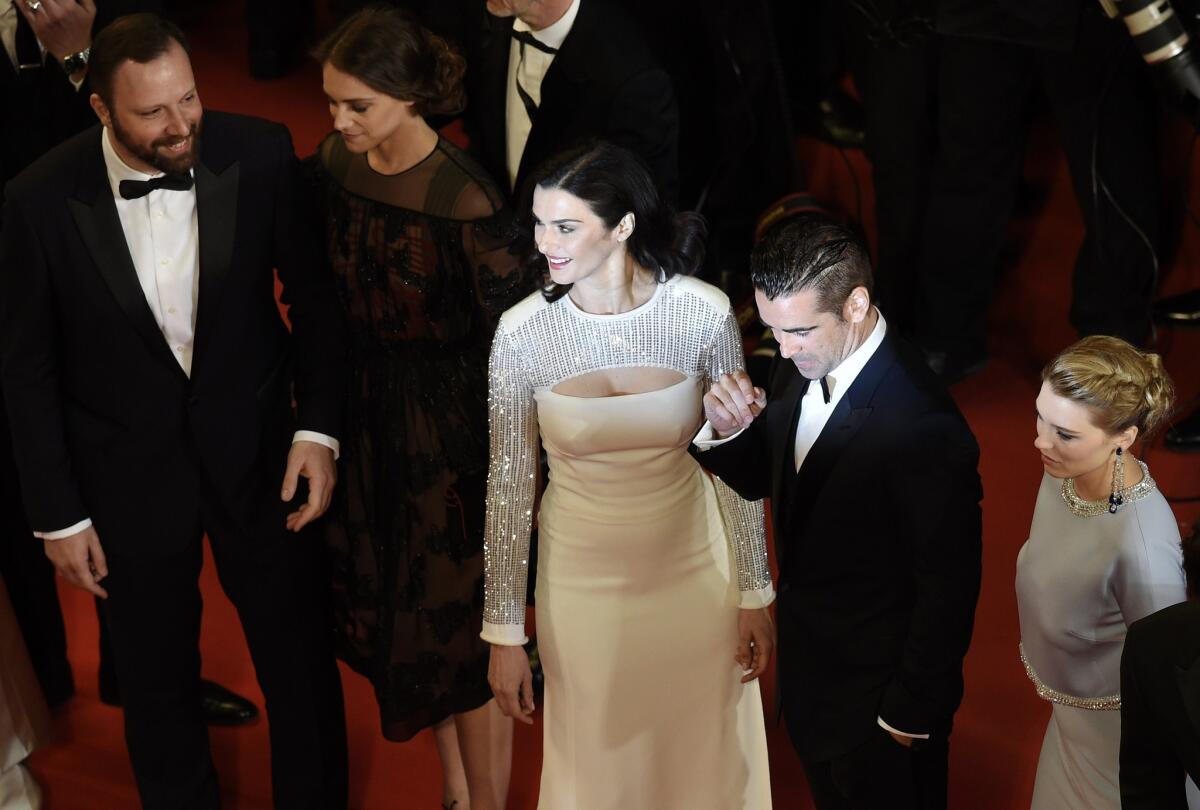Cannes 2015: With ‘The Lobster,’ director keeps swimming in rebel waters

From left, director Yorgos Lanthimos and actors Ariane Labed, Rachel Weisz,
- Share via
Reporting from Cannes, France — As cinema motifs go, the tension between singles and couples is nothing new; it’s the stuff of many a rom-com and a fair share of dramas. But turning it into the material of dystopian fiction — where those who can’t find a mate are sequestered, hunted, then turned into animals? That might be the more exclusive province of Yorgos Lanthimos.
You may recall Lanthimos from his art-house shock hit “Dogtooth” in 2009. The film, which scored a foreign-language Oscar, involved a couple that kept their children imprisoned on their property into adulthood. In his new English-language movie “The Lobster,” which premiered Friday at the Cannes Film Festival, Lanthimos builds a potentially even more disturbing (if frequently deadpan) world.
Colin Farrell is a seemingly ordinary divorcée who, like other seemingly ordinary divorcées in this alternative, European-seeming country, is sent to a hotel after his separation. It’s a nice-looking place — golf courses, lakes and the like — but it turns out that’s all a front; the institution is a prison of sorts where men and women are encouraged to pair up, often with the help of dances and some instructional theater helpfully showing the value of same.
Or, rather, they’re deterred from not hooking up. If after about a month they fail to do so, they’re turned into an animal of their choosing. (Farrell’s character opts for the titular creature.) Residents are able to extend their pre-animal time if they hunt down singles in a nearby woods, giving the proceedings a “Hunger Games” spin.
The rules of the surreal world are subtly explained (there are plenty of other complicated ones), but the reasons never are. Lanthimos and his longtime co-screenwriter Efthimis Filippouis are more interested in simply observing what happens when people are stuck in such a world, and what that says about our own.
“We don’t want to just represent reality,” he said. “We’re trying to push and exaggerate things in order to reveal the absurdity.”
He added, “Part of the fabric of the film is that people feel the pressure to be in a relationship, and what we wonder is if that’s what you would feel if you weren’t so strictly educated to feel that way. Would you naturally tend to feel that? Or how much do education or propaganda play a part? Does the idea that you’re never going to be happy being alone come from other people or within?”
Lanthimos is on a rooftop deck Saturday in this coastal French town, less than 24 hours after his film debuted. The director moved from his native Athens to London several years ago, and this is his first film with English-language stars. (Rachel Weisz and John C. Reilly also have prominent roles.) That could give the movie some added appeal in the U.S. — though the director is keen on making the narrative do some of that work all on its own.
“Lobster” ups the ante when, via an entertaining series of plot turns, it shows the other side — a commune where coupling up is forbidden. At that point, it’s clear that the film’s relationship-specific commentary, trenchant as it is, takes a back seat to a broader, more metaphorical point.
“I’m much more interested in the irony of people breaking away from a system and somehow they find themselves creating another similar one,” he said. “It just seems like a pattern people follow in political or personal life.”
The movie, which is seeking U.S. distribution at the festival, has garnered a strong reaction — it’s a brilliantly deadpan examination of the social pressures for and within a relationship, though also divisive, with some puzzling over the conceit and where Lanthimos takes it. As “Dogtooth” fans know, this is a filmmaker you’re either deeply on board with or you’re not.
Lanthimos says his own philosophy has not been to shock as much as to question — relationship logic here, family structures in “Dogtooth” — and to use a distortive lens to do so.
“We consider a lot normal when we’re going through something and then when we observe it from a distance we realize how absurd it is,” he said. “I think we get comfortable and don’t bother to question. I personally get irritated most when I hear the phrase, ‘This is how it’s supposed to be.’ And it’s scary. Because when you say that you can’t see how things have changed or how things should change.”
More to Read
Only good movies
Get the Indie Focus newsletter, Mark Olsen's weekly guide to the world of cinema.
You may occasionally receive promotional content from the Los Angeles Times.











